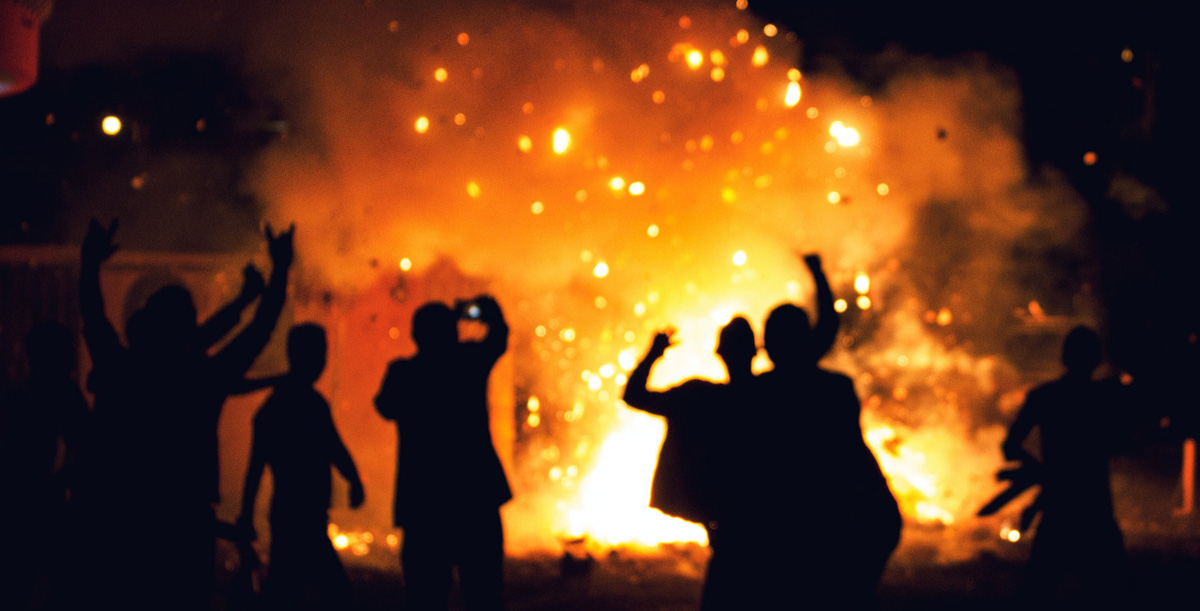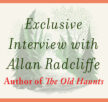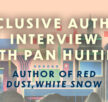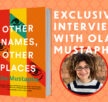Motherland

It’s only a matter of time before someone gets killed, said Isaac, naked but for a pair of shorts and beautiful in the way that the young are beautiful, through the sheer fact and vitality of youth. He held a cold can of beer against his cheek.
Please be careful, Sonia said. I worry about you out there.
He gave her that look that said please don’t make a fuss.
Don’t worry, I’ll be fine.
Will you? Someone will get killed, you said so yourself. What’s to stop that someone being you?
Come on, I’m not stupid, mum, he said, as though stupidity had anything to do with it.
Isaac was right, of course; sooner or later someone would get killed. It was inevitable. What began with slogans and flag-waving had moved on to violence. If everyone continued to raise their game, as they had so far, someone would pay with their life, and that death would have to be avenged, and so it would go on.
Sonia looked across at the apartments opposite, mostly shuttered against the sun. The crushing heat had settled on the city for weeks, a life-sapping heat that dulled the senses and shortened tempers. The city was at war with itself. The riots, sporadic at first, were now almost routine. There were running battles. Rioters built barricades of plastic rubbish bins, then set them alight. The bitter stench of burning plastic replaced the city’s peacetime aroma of piss and marijuana while the heat settled on its sleepless citizens like a fat, dirty hen, muting the sounds of life save for the summer soundtrack of surveillance helicopters clattering above the streets and the whoop-whoop of sirens.
Isaac had resisted the nationalist pull so far, with its easy answers to complex questions. Sonia admired him for that; it took guts, now that the tide was mostly running one way. He belonged to some sort of anarchist group which as far as she could tell took the position that it was all shit. Everything, whichever side they were on, which, given the general level of mendacity dressed up as righteous indignation, seemed like a legitimate position.
Later that afternoon, after Isaac had gone back out to do battle with whoever, Sonia’s younger son Marc sat with his back to her as she pulled a nit comb gently through the boy’s hair. She slid a bug from between the steel tines and crushed it between thumbnail and forefinger, then wiped the dark smear of blood on a cloth and watched as a helicopter hovering above their block banked away towards the north. The cat slept, stretched out in the shade, exhausted by the heat.
She drew the comb through Marc’s damp, brown hair, wiped it on the cloth and inspected it for bugs and eggs. The boy, his skin honey-tanned, sat still and uncomplaining. Sonia repeated the procedure. The boy’s hair was fine and straight and the comb didn’t snag. She wiped the sweat from her brow with the back of her hand.
Find any? the boy asked.
A couple. Mostly eggs.
Black smoke rose beyond the roofline of the buildings opposite. Isaac was out there somewhere, face hidden behind a scarf, starting fires and running from the cops. The conflict had become like the weather, the oppressive heat; it just went on and on, no end in sight, nor apparently any will to end it. The worst sort of people had come to prominence and in turn brought out the worst in everyone else. Pandora’s box was open. Now people shouted things that before they barely dared whisper, puffed up with righteous rage; salting their wounds, lest they heal; who was right and who was wronged, everyone but themselves to blame; insults at first, now stones and petrol bombs.
There were twelve apartments in the building. Seven of them sported nationalist flags tied to their balconies. Barely a month ago there were only five; a year ago just a couple. It frightened her, this consensus that was partly borne out of fear of standing out from the crowd. The word traitor circulated freely, often about anyone who refused to fall in line. She hated what was happening. It was as though everyone had lost their mind. She had lived here all her life but had begun to feel like a stranger in her own city.
Sonia wondered what she would do when her balcony was the last without a flag. Would she get one for the sake of a quiet life? Or would she say no, no flags for me? Would she make a principled stand?
Sonia looked up from grooming Marc. A plane came in low from the north, delivering another batch of tourists. They kept coming, despite the conflict, the riots and rubber bullets, the seemingly endless recession and the bogus economic recovery trumpeted by the government and the IMF but which had somehow failed to reach the people of all ages who slept in doorways and scrabbled in bins for food. Most visitors simply shut it out or didn’t seem to notice; to others it was one more attraction. Sonia had seen tourists taking selfies with the riot squad baton-charging protesters as a backdrop.
She rested her hand for a moment on Marc’s bare shoulder. The skin on the back of her hand was taking on a papery quality; another sign of age. It contrasted with Marc’s smooth, flawless skin. She felt a surge of love for the boy as she crushed another bug with her nail. Her neighbours, except those whose balconies were still in the sun, sat out. Some read magazines, some fanned themselves, most just sat, waiting for the air to cool.
The sky clouded over and the pressure dropped. There was a vague sense of impending rain, but it was probably another false alarm. It was like the undertow of anticipation when the house lights dim and the orchestra starts tuning up, but then nothing happened, there was no concert. The rain never came.
Sonia’s nearest neighbour was a woman in her late thirties with dyed red hair who was always reading. She sat on a blue folding chair, a book on her lap and a drink at her side on a small folding table. When they passed each other in the street or the market they exchanged smiles and said hello but never had a conversation. She had a round face and greenish eyes. The ice clinked in the glass as she put the drink to her lips and, sensing Sonia’s gaze, caught her eye and raised the glass. Sonia held up the nit comb in salutation. The neighbour smiled faintly and went back to her book.
In the hotel opposite, clients sat outside on the balconies even though they were still in full sun, the men shirtless, the women in bikinis or halter tops and shorts, their pale skin burnt pink and striped with strap marks. In the morning these transitory beings would be gone and the chambermaids – small, dark-skinned women in black uniforms and white aprons – would appear, sweeping balconies, cleaning the windows and stripping and making up the beds. It was as though the chambermaids were the rightful residents and the tourists intruders, who were permitted to stay a night or two but whose existence was then swept away into a bin bag. On a hotel balcony a young woman in a skimpy dress sat on her boyfriend’s knee. The boyfriend slid his hand between her thighs and she slapped it away playfully.
So, they still do that, Sonia thought, girls still sit on their boyfriend’s lap. It struck her as old fashioned, at once possessive and submissive. She imagined the couple were on holiday and would have sex later, if they hadn’t already, and then go out for dinner.
I saw the world’s biggest yacht this afternoon, Marc said. It’s moored in the old port.
Really? What’s it like?
It’s huge. It’s not like a yacht at all, it’s a ship. As big as the ferry. Except it’s a sort of yellow colour, not white like the others.
Do you know who owns it?
Some Russian guy. It cost €600 million. I Googled it. It’s so big there’s a bit where a helicopter can land. It’s amazing.
Amazing, Sonia repeated.
What? Marc said, catching her tone.
Six hundred million. What a waste of money. Imagine how much good you could do with that much money.
Marc sighed. His mother had a way of raining on his parade. She could be a real downer at times.
It’s just that I don’t see why having masses of money and then showing off by spending it on a yacht is something to admire.
It’s OK, mum, Marc said wearily. I get it.
Sonia felt bad. The kid was just making conversation, and young boys like anything that’s big; big is good, biggest is best. It didn’t mean the boy approved of Russian oligarchs. She should have let it go. That was something people said about Sonia, that she was serious. It wasn’t a compliment; it was a complaint.
I’m sorry, she said. I didn’t mean to go on.
The boy shrugged. She continued combing, although she’d probably got all the nits and eggs by now, but she wanted to hold on to the moment − a peaceful, human-animal moment, primeval, the way apes groom one another − and the tender love she felt for the child. Marc was an easy-going boy. He abhorred conflict, unlike his older brother who was born feeling short-changed, always indignant, as though the life he’d been given wasn’t the one advertised in the brochure. Marc, on the other hand, was like a balm to Sonia’s chafed soul.
She found it hard to let things go (that was another complaint). She was forever questioning, interrogating. Even this peaceful moment with Marc, she couldn’t just accept that she felt at peace, happy even, in spite of everything. No, she held the feeling of peace up to the light and examined it, rather than let it simply lap against her inner shoreline. And the act of examination changed it; it always did. However clear and unalloyed the sentiment, once examined it became suffused with melancholy, like a splash of Angostura bitters clouding a glass of gin.
Are we done? Marc asked. I have to go soon.
Yeah, we’re done. Bug free, for now at least.
She set the comb and cloth down on the table. Marc leaned his smooth tanned back against his mother and rested his head against her. Sonia caressed his shoulder absent-mindedly.
Marc was going to spend the weekend with a friend who lived a few blocks away. Then next weekend the friend would come to stay. That way each set of parents got a weekend without children. Sonia looked forward to her child-free time, but as soon as Marc went, she always felt bereft. There was Isaac, of course, but he came and went as he pleased, passing through the fridge like a one-man plague of locusts before heading back out or retreating to his bedroom. Marc was ten and Isaac nineteen. Half her life had been set to their rhythm. Two boys, two fathers, two separations. Not a brilliant track record, she’d be the first to admit. Isaac’s father left her for another man. She didn’t see that coming. With Marc’s father it was less dramatic. After Marc was born, he seemed to lose interest in life and in her. They ate in silence, they never went anywhere together, they stopped having sex. She asked him to leave and he left.
Have you got your stuff ready?
Yup.
OK, give us a kiss and off you go. See you Sunday.
She held him against her, steeping herself in his aroma of young, sunned skin. Marc wriggled out of her embrace and was gone with a bang of the door. The cat pricked up one ear but didn’t move. For the first half hour after he left, she felt unmoored and momentarily at sea. Of late, she’d felt increasingly… What was it? Redundant. As a mother, that is. Not that a mother was all she was but it had become her core. Everything else was what she did; being a mother was what she was.
She thought about Isaac, so cocksure and carefree. Young men crave action, that was part of it. Women bring life, men bring death, that was Sonia’s sister’s take. That was a bit extreme, but her sister had a point. Making and nurturing life is a drawn out, laborious and often tedious enterprise. Nurture is by its very nature repetitive, a slow grind producing even slower progress. It is not glamorous. There are no computer games where the object is to soothe a wailing child or where the player gets points for not losing their cool when a senile parent asks the same question for the tenth time in as many minutes.
So hard to make a life, so easy to take it, she thought. But nurture can’t compete with murder; murder has all the panache that nurture lacks. Hands on hips, it’s chic and sleek. It speaks a snappy vernacular: waste, smoke, blow away, chill, clip, top, whack. Murder has finesse, verve, élan. In contrast, nurture mumbles and shambles, dishevelled; one of its buttons is undone, there is a damp stain on its shoulder. Nurture’s vocabulary is just as limp: nurse, nourish, foster, sustain. Ending a life takes a moment and has all the brio of decisive action. These are virtues of the moment, they cannot be sustained, a life cannot be lived with finesse; life is too long for that. A life is made and re-made; it doesn’t make such good theatre as death. Death can be delivered in style − the blunt beauty of the small automatic, the spangle of light on the blade before it plunges into the dark organ, the kung fu kick, the karate chop, the uppercut that lifts you off your feet and out of this world – a single act that puts an end to all others. It’s well documented that men are often sexually aroused by the act of killing. Sonia didn’t know what to make of that; that the act of ending a life should stimulate a man’s life-making apparatus.
The neighbour across the way looked up at the sky and untied her flag from the balcony. Sonia laughed. Even if it did rain, the flags were made of polyester.
The neighbour caught her eye as she folded the flag and raised her left hand in the nationalist salute. Sonia didn’t return the salute.
A helicopter held a position about five blocks north. An ambulance passed. Sonia knew the difference between one siren and another. She thought about Isaac, and almost immediately shut out the thought. There was no reason to think the ambulance was for him. The redhead across the way refreshed her glass and settled back into her book.
As the sun went off the balconies, more neighbours appeared. The young man on the hotel balcony slid his girlfriend off his knee and went inside. He reappeared with two cans of beer. Sonia looked at her phone. Riots had broken out at various points in the city. The nationalist leader defended people’s right to protest at the interior minister’s visit. It was, in effect, a call to arms. The leader of the opposition, afraid of being on the wrong side of history, made a lame appeal for calm. All police leave had been cancelled.
A sudden escalation in the violence, according to a police spokesman. There were reports of a fatality during clashes on the airport road. There are no other details at present, the spokesman said. Please don’t let it be Isaac, Sonia said out loud. She looked up at the sky.
I wish it would rain, she said.
Sonia watched the news stream on her phone. A reporter gave a to-camera piece from the scene of the riot. The reporter looked anxious as people milled around him, pulling faces and shaking their fists. Sonia searched for Isaac in the crowd. The reporter said a large crowd ambushed the interior minister’s car on its way from the airport. Police baton-charged the crowd and fired rubber bullets. There were conflicting accounts about what had happened. Protesters claimed the victim died as a result of police brutality; the police said he was hit on the head after rioters started hurling paving stones. The fatality, as the reporter insisted on calling the dead man, had been identified but police were not releasing his name until his family had been informed. He was thought to be nineteen years old.
Jesus, no, please no.
The reporter read out a statement from the president saying he deeply regretted the loss of life and his thoughts and prayers were with the family of the deceased.
Fuck you, Sonia said to the screen. You started this; this is on you.
She sent Isaac another message. Please call me.
The helicopter was back. On the hotel balcony opposite the woman who had been sitting on her boyfriend’s knee had dressed up for the evening and was taking selfies. On the next balcony, two young women, white as milk, with sunburned chests and shoulders, were drinking cava from plastic cups. The humidity was so high the air seemed to press against her flesh. Once again there was a sense of an impending storm, a glowering sky off to the northwest. Maybe this time it was more than a rehearsal, maybe this time it would really rain.
She tried not to think about Isaac but the thought wouldn’t go away. The victim was nineteen, that’s all she knew. He said someone’s going to get killed and she said what’s to stop that someone being you. She wished she’d never said that. It felt like a curse, like asking for bad luck.
There was thunder, it was definitely thunder, though distant. The red-haired neighbour was out, book on her lap, drink at hand. Sonia wanted a drink herself but resisted, feeling she needed her head to be clear, in case. She didn’t linger on in case of what.
The thunder rolled, though still far away, and the temperature began to drop. The cat sat up, eyes wide and fur fluffed up, ears turned like scanners towards the northwest, where the weather was coming from. The sunbathing women shivered and retreated indoors. Most of the tourists had gone inside – they hadn’t come all this way for a thunderstorm – while the neighbours began gathering on their balconies, thirsty for rain, or at least a break in the weather. For half an hour the thunder rumbled on without getting any closer. The helicopter went away, retreating from the impending storm.
The temperature had dropped sharply and the sky darkened to a murky blue-black. A chill wind picked up. The screeching swifts disappeared. The cat’s fur stood on end and its ears twitched like antennae. The baby in the apartment below, a child that cried almost without pause, fell silent. Sonia shivered. Shivering was a pleasant and all but forgotten sensation. The thunder rumbled on and sheet lightning lit the sky. But there was still no rain. It continued like that for another half hour; the cracks of thunder closer and louder and the lightning stark against the darkening sky. Sonia sat and shivered. There was no news, or just the same news on a loop. She wished her boys were home, altogether, safe from harm, wagons in a circle.
A solitary fat drop of rain landed splat on the terrace below. Everyone looked up to see if there was more to come. There was another drop – splat – then another and another – splat, splat, splat – then the rain was plop-plopping in fat drops but it still felt like a tease, these few drops, it wasn’t real rain, not the downpour that had been promised all day.
And then it came. The thunder cracked right above their heads and the cat fled indoors. The rain came down as though someone had kicked open a sluice, a deluge, a tumultuous curtain of water, improbable as Hollywood rain, accompanied by thunder cracks as the lightning fizzed across the sky, like the grand finale of a bombastic stadium rock concert. The rain fell so hard and thick that Sonia could barely see across to the hotel where a few guests stood, still in their shorts, pale arms folded, disconsolate. Everyone else was out now, just watching it rain. It was spectacular.
Sonia sensed someone behind her and turned to see Isaac in the doorway. In a second, she passed through oh thank god, you’re safe, to why the fuck didn’t you answer my messages but before she could speak she was silenced by the look of distress on his face. He was nineteen years old with a stubbly beard, but what she saw was a frightened little boy in need of comfort.
She put her arms around him and held him tightly, claiming him, fastening him to her. He smelled of sweat and hormones. He didn’t pull away like he usually did, but let his arms flop loosely around her shoulders, acquiescing to her embrace, but reluctant at first to return it. He was taller than her. His chin rested on her shoulder, cheek to cheek. His body was hard and spare. She could feel him needing to cry, knowing he wouldn’t. They stood like that for a minute or two, taking comfort from each other.
Do you want to talk about it?
He shook his head against hers.
Did you know the boy who died? Was he a friend of yours?
Sort of, not really. I knew him from, you know, around.
What happened?
It was crazy. Everyone just sort of lost it. Totally. He got beaten up really badly. I saw it. There was nothing I could do.
By the cops?
No, it wasn’t the cops.
So here we go, Sonia thought. A martyr to the cause, though she didn’t know which cause. It probably didn’t matter.
Isaac disentangled himself and they turned to watch the downpour. He stood behind his mother, resting his hands on her shoulders, her little boy, now a head taller than her. She leaned her head against his chest, just as earlier Marc had leaned his against her. The red-headed neighbour stood at the railing of her balcony, out of the shelter of the balcony above, soaked to the skin, hair plastered to her head, with her arms aloft, like a diva in a tragic opera about to deliver an aria. She turned to Sonia and started laughing, a joyous, crazy laugh as the rain sluiced off the roofs and sheeted down from the overflowing gutters and for the first time in weeks the air smelled fresh and clean and new.
You’re crying, mum.
Sonia sniffed and nodded.
Why?
Why? Did there have to be a why? Because it was raining at last and the rain at least was something tangible, something real and unvitiated amid all the posturing, all the bad blood and manufactured hatred and flags and declarations and pettiness and above all the ceaseless, relentless, life-sapping mendacity of it all. And because her son was here with her and he was young and alive and beautiful simply by existing and she loved him beyond reason because having children meant that come what may you were condemned to be desperately, terrifyingly, irrevocably in love with them for the rest of your days and because it was someone else’s boy who died, someone else’s loss, not hers, and right now the rain was washing everything away, the heat, the hypocrisy, the hatred and it felt like they’d waited forever for this and just then she could imagine this was the beginning of something new, something better. Sonia reached up and took both his hands in hers.
It’s nothing, sweetheart, she said. I’m just crying, that’s all.
For more writing by Stephen Burgen, read his short story ‘The Jacket‘
For more short stories, subscribe to our weekly newsletter.














